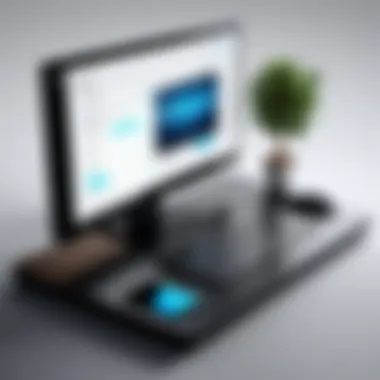Understanding RMS Hotel Software: Key Insights


Intro
In the modern hospitality industry, the importance of efficient operations cannot be overstated. RMS hotel software serves as a critical component, aiding establishments in managing various aspects of their operations. This software provides a comprehensive solution for tasks such as booking, guest management, and revenue optimization, crucial for both small and large businesses within the sector. As the landscape continues to evolve, understanding the functionalities and implications of RMS hotel software becomes essential for managers and IT professionals alike.
Software Overview
RMS hotel software encompasses a wide array of features designed to streamline hotel management. It can automate booking processes and optimize room rates, allowing for effective inventory management. Additionally, the software includes customer relationship management (CRM) tools that help hotels better understand and serve their guests.
Software Features
Key features that typically define RMS hotel software include:
- Reservation management: Simplifies booking processes by allowing real-time updates and availability checks.
- Channel management: Integrates with multiple distribution channels to ensure that availability and pricing are accurate across all platforms.
- Reporting and analytics: Provides insights into occupancy rates, revenue, and customer behavior, assisting in strategic planning.
- Front desk operations: Streamlines check-in and check-out processes, enhancing overall guest experience.
- Payment processing: Facilitates secure transactions, supporting various payment methods.
These features contribute significantly to improving operational efficiency and enhancing guest satisfaction.
Technical Specifications
When assessing RMS hotel software, it's important to consider its technical specifications. Typically, this software can be cloud-based or installed on local servers. Cloud-based solutions offer advantages such as remote access and automatic updates, while on-premises installations may provide more control over data management. Performance metrics, user interface design, and integration capabilities with existing systems also play a vital role in determining the most suitable option for a hotel.
Peer Insights
Understanding RMS hotel software from real-world users provides valuable context to its capabilities. Insights from both users and experts shed light on practical experiences and common pain points.
User Experiences
Feedback from users varies, but many report improvements in operational efficiency and guest satisfaction. However, learning curves are common, especially with extensive functionalities. Users highlight the need for proper training and support during the initial setup stages.
Pros and Cons
When considering RMS hotel software, it’s essential to weigh the pros and cons:
- Pros:
- Cons:
- Enhanced efficiency in booking and managing reservations.
- Improved guest engagement through better service.
- Valuable analytics to inform business strategy.
- Initial setup can be resource-intensive.
- Ongoing costs for software updates and support.
- Potential complexity requiring dedicated training for staff.
"Choosing the right RMS hotel software can be a game-changer for your business, but thorough research is essential."
Prologue to RMS Hotel Software
In the rapidly evolving landscape of the hospitality industry, RMS hotel software plays a crucial role. It enables hotels to manage operations efficiently, optimize guest experiences, and ultimately improve their bottom line. Understanding this software is becoming increasingly important for both small and large businesses in the sector. The integration of technology into hotel management is no longer an optional adjunct, but rather an essential aspect that can define success.
Definition of RMS Hotel Software
RMS hotel software refers to a set of integrated tools designed specifically for the hospitality industry. It encompasses a variety of functionalities, including reservation management, channel management, reporting, and customer relationship management (CRM). This software enables hotel operators to streamline their operations by automating tasks that were previously manual, reducing the potential for human error and increasing operational efficiency.
RMS systems typically include features that allow hotel staff to keep track of room availability, guest preferences, and financial reporting. They also facilitate communication between various departments within the hotel, enabling a seamless flow of information that is vital for effective management.
Historical Context and Development


The trajectory of RMS hotel software began in the late 20th century as the hospitality industry recognized the need for automation. Initially, many hotels relied on rudimentary systems, such as paper logs and manual entry for bookings and customer records. However, as demand grew and the number of guests increased, so did the need for more efficient management tools.
The 1990s saw the advent of early computer-based systems, which laid the groundwork for today's sophisticated RMS solutions. The introduction of the internet further revolutionized hotel management by allowing hotels to connect with global distribution systems. This technological evolution has led us to a current landscape where robust RMS software is not only expected but essential.
Currently, many RMS systems are cloud-based, providing flexibility and scalability that traditional on-premises systems could not match. They offer the advantage of being accessible from any location with internet access. Hotels today can choose from a variety of providers, each offering unique features, costs, and support levels. With technology consistently advancing, RMS hotel software continues to develop, enhancing its capabilities and improving user experiences.
Key Features of RMS Hotel Software
The features of RMS hotel software are crucial in determining its effectiveness for hospitality management. An understanding of these features allows managers to choose the right tools that will enhance their operations. Various functionalities cater to specific operational requirements, from reservation management to customer relationship management, all contributing to more streamlined processes in the hotel industry.
Reservation Management
Reservation management is one of the fundamental aspects of RMS hotel software. This feature enables hotels to handle bookings efficiently. Users can track room availability, make new reservations, and manage cancellations seamlessly. A sophisticated reservation module reduces human error, thereby minimizing double bookings.
Moreover, automated confirmation emails and reminders provide a professional touch. As a result, guests feel more valued, enhancing their overall experience. This level of management is essential for optimizing occupancy rates and improving revenue.
Channel Management
Channel management plays a significant role in modern RMS hotel software. Hotels sell their rooms through various online travel agencies (OTAs) and booking platforms. Effective channel management ensures that availability and rates are consistent across all channels. By automating updates, hotels can avoid the pitfalls of overbooking and rate disparities.
Furthermore, advanced analytics in channel management helps in understanding which channels generate the most bookings. This insight can inform marketing strategies and pricing adjustments. Proper use of this feature can lead to increased revenue while maintaining strong partnerships with OTAs.
Reporting and Analytics
The reporting and analytics features in RMS hotel software offer invaluable insights. This functionality allows users to pull various data reports regarding occupancy rates, revenue per available room (RevPAR), and average daily rate (ADR). Managers can assess performance trends over time, which aids in strategic decision-making.
Visual data representation helps users quickly grasp complex information. For instance, dashboards can display key performance indicators at a glance. Such insights empower hotel operators to make data-driven decisions that align with their business goals.
Customer Relationship Management (CRM)
The CRM module in RMS software is vital for fostering guest loyalty. It enables hotels to collect and analyze customer data, providing personalized experiences. By tracking guest preferences and history, hotels can create tailored offers that appeal to individual guests.
Additionally, effective CRM improves communication with guests. Automated follow-ups and loyalty program alerts keep guests engaged with the brand. This long-term relationship can translate into repeat bookings, contributing positively to revenue. A well-implemented CRM strategy can significantly enhance the customer's journey, asserting the hotel’s commitment to excellent service.
Benefits of Implementing RMS Hotel Software
The implementation of RMS hotel software offers a multitude of advantages, making it a vital component for both small and large hospitality businesses. Enhancing operational effectiveness, improving guest experiences, and optimizing revenue management are some of the primary benefits that this software provides.
Efficiency and Time-Saving
Implementing RMS hotel software simplifies many complex processes. Tasks that once required substantial time and resources can now be managed seamlessly through automation.
For example, automated reservations allow hotel staff to reduce time spent on manual bookings and confirmations. This shift leads to a more efficient workflow and frees up employees for other vital tasks. Staff can focus more on customer service, which is essential for hospitality.
Further, RMS systems often integrate with other software solutions. This integration minimizes the need for duplicating efforts across various platforms, resulting in a streamlined operation. Employees can access all necessary information from one interface, reducing the potential for errors.
Improved Customer Experience
A careful focus on customer experience leads to greater satisfaction and loyalty. RMS hotel software enhances how hotels engage with their guests. From online booking systems to personalized communication, software tools can manage reservations and tailor offerings based on guest preferences.
Moreover, the analytics provided by RMS software allow hotels to anticipate guest needs, enhancing interactions and services offered. Quick responses to customer inquiries become easier. For example, guests can receive immediate confirmation of changes to bookings. This responsiveness creates a positive impression, essential for repeat customers.
"A well-implemented RMS can significantly enhance guest satisfaction, directly correlating to increased loyalty and revenue.”


Increased Revenue Management
Revenue management is a critical aspect of the hospitality business. RMS software plays a major role in this area by analyzing trends and data to maximize profits. The software helps hotels understand their occupancy patterns, allowing for smarter pricing strategies.
Utilizing data analytics, hotels can adapt their pricing based on demand. This means increasing rates during peak seasons or adjusting based on competitive pricing. Furthermore, the analytical tools can help identify which services generate the most revenue and which may need reevaluation.
In summary, RMS hotel software is not just a facilitative tool; it is a strategic partner in enhancing efficiency, improving customer relations, and optimizing revenue opportunities. The importance of these benefits highlights the need for careful consideration in adopting reliable RMS solutions.
The Role of RMS in Modern Hospitality
RMS hotel software plays a crucial role in the contemporary hospitality industry. It serves as a central hub for managing various operational aspects, assisting hotels in enhancing their service delivery. As the hospitality sector faces increasing competition and evolving customer expectations, the integration and functionality of RMS become more significant. Understanding how RMS fits into modern operations can help stakeholders recognize its strategic importance for growth and efficiency.
Integration with Other Systems
RMS hotel software is increasingly designed to work seamlessly with other systems within the hospitality ecosystem. This integration is essential for ensuring smooth operations. Common integrations include Property Management Systems (PMS), Customer Relationship Management (CRM), and Point of Sale (POS) systems. By connecting these platforms, hotels can streamline their data flows and improve operational performance.
For instance, a hotel that integrates its RMS with a PMS can automatically update room availability as reservations are made. This real-time synchronization minimizes errors and enhances the guest experience. Moreover, integrating RMS with CRM enables personalized marketing campaigns based on guest preferences and history. These enhancements are essential to meet growing customer expectations for tailored services.
Impact on Operational Management
The implementation of RMS hotel software profoundly impacts operational management. The software's capabilities allow hotel managers to oversee multiple processes from a single platform. This includes managing guest bookings, tracking housekeeping schedules, and conducting inventory management.
By automating routine tasks, RMS reduces manual workloads. Staff can focus on delivering exceptional service rather than being bogged down by repetitive administrative duties. This improved efficiency can lead to reduced operational costs and better resource management.
Additionally, RMS provides data analytics tools that offer insights into performance metrics. Managers can evaluate occupancy rates, revenue per available room (RevPAR), and other key performance indicators. This data-driven approach enables informed decision-making and strategic planning, further optimizing operational management.
"The integration of RMS with various systems creates a robust framework for hotels to manage operations efficiently while enhancing guest satisfaction."
In summary, the role of RMS hotel software in modern hospitality transcends mere functionality. Its integration capabilities and effects on operational management are essential for hotels striving to enhance efficiency and provide superior guest experiences. By understanding these elements, hotel operators can leverage RMS to their advantage in a competitive marketplace.
Challenges in Using RMS Hotel Software
In a fast-evolving hospitality sector, the adoption of RMS hotel software presents several challenges that need careful consideration. These challenges can significantly impact the success and efficiency of hotel operations. It’s crucial for hotel managers and decision-makers to understand these aspects to make informed choices. By addressing these challenges, they can better leverage the capabilities of such systems.
Cost of Implementation
Implementing RMS hotel software involves substantial upfront costs. This includes expenses related to software licensing, hardware upgrades, and sometimes, necessary training for staff. Hotel operators often underestimate these costs, thinking that only the purchase price matters. However, ongoing support and system maintenance can add up over time.
In addition to tangible costs, there are potential hidden costs. These can include downtime during the transition, impacts on customer service, and employee adaptation periods. Having a comprehensive strategy that accounts for these factors is fundamental. Without this foresight, it can lead to budget overruns and resource misallocation. Thus, financial projections must include estimates for all phases of software deployment.
- Software Licensing Fees
- Training Costs
- Hardware Upgrades
- Ongoing Support Fees
Complexity of Software Selection
Selecting the right RMS hotel software can be a daunting task. With myriad options available, each software has distinctive features, as well as varying degrees of usability and integration capabilities. This complexity can overwhelm many hotel managers, particularly those who may not be tech-savvy.
The process often necessitates a thorough assessment of specific needs versus available functionalities. A misalignment here can result in the acquisition of software that does not address operational demands adequately. Also, making decisions under pressure or without sufficient research may lead to regretful outcomes.
Moreover, the software selected should integrate seamlessly with existing systems. This requires a comprehensive understanding of both current and future technical requirements assessed against the software's capabilities. Organizations may benefit from consulting IT professionals to facilitate this process, ensuring that the chosen system is scalable, adaptable, and user-friendly.
"Choosing the right RMS requires more than just looking at features; it’s about how well it fits within the existing operational ecosystem."


In summary, addressing the challenges in using RMS hotel software is not only about recognizing these potential pitfalls but also preparing to navigate them successfully. By understanding the costs involved and the complexity of software selection, hotel operators can enhance their decision-making process and maximize the benefits of their RMS investment.
User Experience Insights
User experience is a crucial factor when it comes to the success of RMS hotel software. A positive user experience can enhance the efficiency of hotel operations, improve staff satisfaction, and ultimately lead to better customer service. Hotel operators often face challenges in ensuring that the software not only meets their technical needs but is also intuitive for staff to use. Understanding the user experience helps highlight specific elements that resonate with operators and employees. It also informs software developers about necessary improvements and features that can streamline operations.
Case Studies from Hotel Operators
In examining real-world applications of RMS hotel software, case studies provide valuable insights into how individual hotels utilize these systems. For example, the Mariott International chain implemented a customized RMS solution to integrate its reservation system with mobile applications. This integration allowed guests to check availability and book rooms through mobile devices, increasing direct bookings and providing valuable customer data for future marketing campaigns.
Another example is the Rosewood Hotel Group, which adopted a comprehensive RMS that centralized guest information. By doing so, staff could access relevant customer preferences and history quickly. This led to a significant improvement in personalized guest experiences and staff performance, as they were able to anticipate guest needs more effectively. Such case studies exemplify how the right RMS can transform operational efficiency and enhance customer relationships in the hospitality sector.
Feedback from End Users
Analyzing feedback from end users presents a direct lens into the effectiveness of RMS hotel software. Many hotel staff members highlight the importance of user-friendly interfaces. For instance, feedback often points out that overly complex navigation can lead to errors during booking or check-in processes, which can frustrate guests and staff alike. Some users have reported that software updates sometimes disrupt existing workflows, leading to temporary inefficiencies.
Other feedback emphasizes the benefits of integrated communication features. Staff often appreciate RMS that facilitate seamless interaction among departments such as front desk, housekeeping, and maintenance. These features not only save time but also help create a cohesive environment that enhances guest satisfaction. Continuous gathering of user feedback remains essential, as it can guide future developments and improvements in RMS functionality.
"User experience can make or break the effectiveness of a hotel management system. Listening to end users helps bridge the gap between software development and operational needs."
Through user experience insights, professionals in the hospitality industry can better navigate the adoption of RMS hotel software, thus ensuring it meets the operational demands while providing a satisfactory experience for both staff and guests.
Future Trends in RMS Hotel Software
The landscape of hotel management is continuously evolving, particularly with advancements in technology. The exploration of future trends in RMS hotel software is crucial. Understanding these trends allows hotels to remain competitive by adapting to changing customer expectations and operational efficiencies. The integration of emerging technologies and enhanced personalization are at the forefront of this evolution, offering substantial benefits to hotel operators.
Emerging Technologies
The inclusion of emerging technologies within RMS hotel software reshapes how hotels manage their operations. Key technologies to watch include artificial intelligence, machine learning, and cloud computing. These elements provide data-driven insights, predicting customer behavior and preferences with increased accuracy.
- Artificial Intelligence (AI): AI can automate routine tasks, such as scheduling and inquiries, allowing staff to focus on more personalized guest interactions.
- Machine Learning: Machine Learning algorithms process vast amounts of data, enabling real-time adjustments on pricing strategies or room inventory based on demand fluctuations.
- Cloud Computing: By utilizing cloud-based RMS solutions, hotels can ensure scalability, flexibility, and simplified data access for remote teams. The migration to the cloud reduces costs related to infrastructure while enhancing collaborative efforts across departments.
The adoption of these technologies leads to increased efficiency, which in turn, can enhance profitability. Furthermore, these systems allow for seamless integration with other operational tools, creating a unified platform for hotel management.
Enhanced Personalization
As customer expectations grow, the demand for personalized experiences becomes indispensable. Enhanced personalization within RMS hotel software addresses this need by leveraging guest data to create tailored offerings.
- Targeted Marketing: With advanced analytics, hotels can segment their customers based on previous stays, preferences, and spending habits. This data helps in crafting targeted marketing campaigns that resonate with specific customer profiles.
- Customized Guest Experiences: Hotels can personalize guest interactions through pre-arrival communication, special offers, and loyalty programs designed to cater to individual preferences.
- Feedback Loop: Implementing systems that regularly gather guest feedback allows hotels to modify their services more effectively. This not only enhances guest satisfaction but also fosters a deeper relationship between the hotel and its patrons.
"Adapt or perish, now as ever, is nature's inexorable imperative." - H.G. Wells
The influence of these technologies on RMS systems signifies a broader shift within the hospitality industry. As RMS software evolves, so too must the strategies and mindsets of those who utilize them.
Culmination
In today’s rapidly evolving hospitality landscape, the significance of RMS hotel software cannot be overstated. It serves not only as a tool for managing reservations but also enhances the overall operational capabilities of hotel management. A comprehensive understanding of this software is essential for decision-makers in the industry. The conclusion brings together critical insights from the article, highlighting the transformative role RMS software plays.
Summary of Key Points
- Key Features: RMS hotel software includes functionalities like reservation management, channel management, and reporting capabilities. These features streamline operations, leading to efficient workflows.
- Benefits: They can offer time-saving benefits by automating various processes, improving customer experience through personalized services, and increasing revenue by employing strategic pricing models.
- Challenges: Implementing such software comes with its own challenges, including costs and the complexity of selection. Proper planning can mitigate these obstacles.
- User Insights: Real-world case studies reflect positive user experiences, affirming the software's value in operational settings.
- Future Trends: Staying alert to emerging technologies and personalization strategies helps professionals remain competitive in a dynamic market.
Final Thoughts on RMS Software Adoption
Adopting RMS hotel software is a significant move for any hotel or hospitality service. It requires careful consideration of features, benefits, and potential challenges. As the industry continues to embrace digital transformation, RMS becomes not just an option but a necessity for operational success.
"Investment in RMS is an investment in future growth. It streamlines processes, enhances decision-making, and drives profitability."
In closing, hotel managers and decision-makers should adopt a strategic approach when integrating RMS software. Understanding its complexities and advantages ensures that they maximize the software's potential, leading to better service delivery and improved guest satisfaction.







